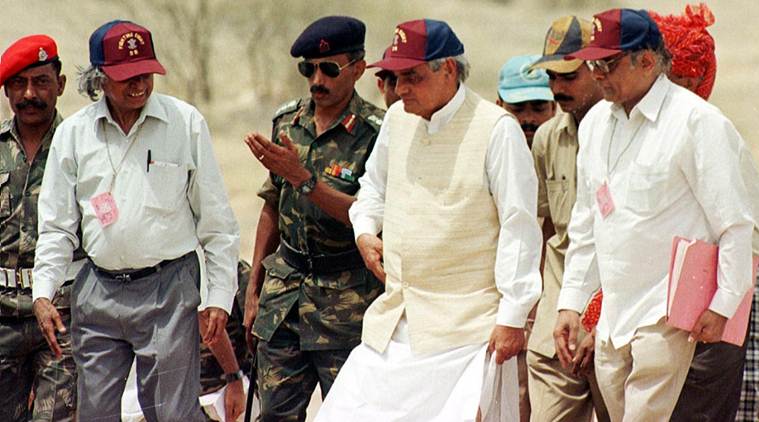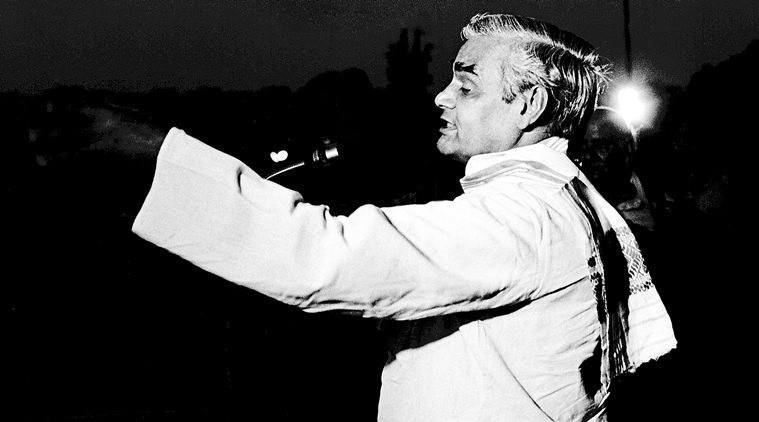 Atal Bihari Vajpayee with Pervez Musharraf. (File Photo)
Atal Bihari Vajpayee with Pervez Musharraf. (File Photo)
On national security, Atal Bihari Vajpayee drew on the legacy of his predecessors but recrafted it fundamentally, most significantly through the nuclear tests of 1998. Days after P V Narasimha Rao’s demise in 2004, Vajpayee publicly acknowledged that in May 1996, a few days after he had succeeded Rao as Prime Minister for the first time, “Rao told me that the bomb was ready. I only exploded it… ‘Saamagri tayyar hai (The ingredients are ready)’, Rao said. ‘You can go ahead’.”
Under Rao, nuclear tests had been postponed in 1995 after the Americans discovered preparations in Pokhran. While Vajpayee took over in 1996, he didn’t go ahead with them as he realised his government would not last. It was when he returned as PM in 1998, as the head of a more stable coalition, that one of his first orders was the ‘go-ahead’ for the tests.
The secrecy around the tests, which left even the CIA confounded, has now entered the realm of legend. The tests also took forward India’s nuclear programme which owed its origins to Jawaharlal Nehru, got weaponised under Indira Gandhi, and progressed under every succeeding PM. Vajpayee pressed on, fully aware that economic sanctions by western governments were a certainty. Those sanctions lasted five years but India was able to last them out, more so than Pakistan, which tested a few days after India.
India becoming a declared nuclear power altered the security paradigm in the region, both vis-à-vis Pakistan and China. Vajpayee responded to it in many ways — announcing a draft nuclear doctrine for public consumption in August 1999, taking steps for greater engagement with China, and allaying global fears of a nuclear Armageddon by making bold peace moves towards Pakistan.
In a breathtaking gesture in February 1999, Vajpayee got onto a bus from Amritsar to Lahore, to be welcomed there by his Pakistani counterpart Nawaz Sharif. Unlike similar gestures towards Pakistan in recent years, Vajpayee’s followed strong diplomatic work, leading to substantive announcements, including the Lahore Declaration.
However, the euphoria of Lahore proved short-lived, as undetected by intelligence agencies or armed forces, Pakistani soldiers infiltrated across the Line of Control, leading to the Kargil War. Despite India and Pakistan being both declared nuclear weapon states, Vajpayee did not hesitate in using armed forces to evict the intruders. That it was done after he had lost a vote of confidence and was heading a caretaker government did not make a difference, and Vajpayee won what turned out to be India’s first televised war.
 Hearing his magnificent oratory, Jawaharlal Nehru had predicted that Vajpayee would be Prime Minister one day. (Photo: Praveen Jain)
Hearing his magnificent oratory, Jawaharlal Nehru had predicted that Vajpayee would be Prime Minister one day. (Photo: Praveen Jain)
This helped him in no small measure win a clear majority in the 1999 general elections. However, the Vajpayee government realised that the Kargil War had also underlined the limitations of India’s national security structures. So Vajpayee established a commission headed by defence analyst K Subrahmanyam to recommend a template for national security reform. This was followed by a Group of Ministers on National Security, which gave its recommendations in 2000. Some of them were acted upon but many about higher defence reform remain unimplemented.
The government also failed to keep its nerves during the December 1999 Kandahar hijacking, when its decision to release three dreaded terrorists was seen as buckling in. Still, in another bold political move, Vajpayee reached out to General Pervez Musharraf, the architect of the Kargil War, after he had deposed Sharif in a coup. The Agra talks of July 2001 failed spectacularly, but reinforced that India was willing to pursue peace with Pakistan.
But then came the Parliament attack of December 13, 2001, and peace was again relegated to the back seat. With the two nuclear powers again head to head, Musharraf made major concessions on Pakistan-based terror groups on television, another first in India-Pakistan relations. It allowed India to move its troops away but set a template for future terror attacks on India with a Pakistani connection — limitations of a conventional war in a nuclear environment were now established.
But another step taken by Vajpayee for peace has stood the test of time. On November 26, 2003, Musharraf and he announced a ceasefire on the LoC. This has held till date.